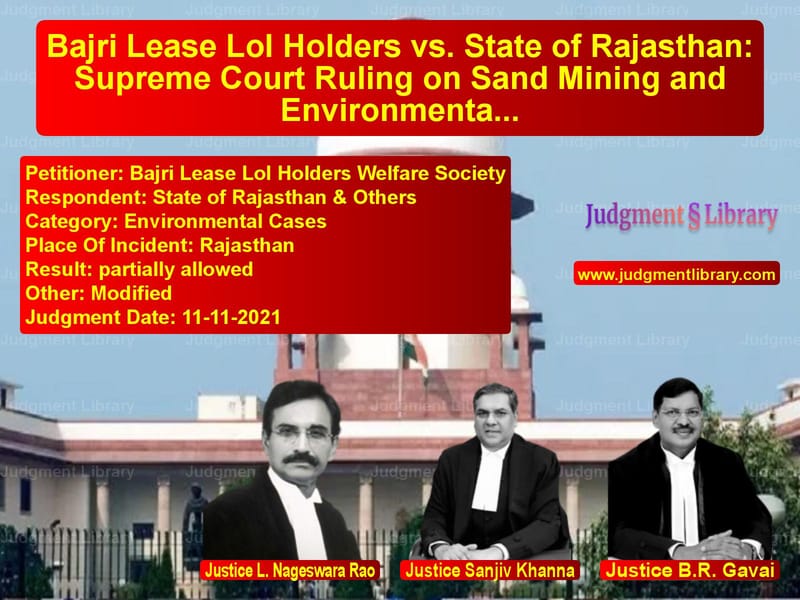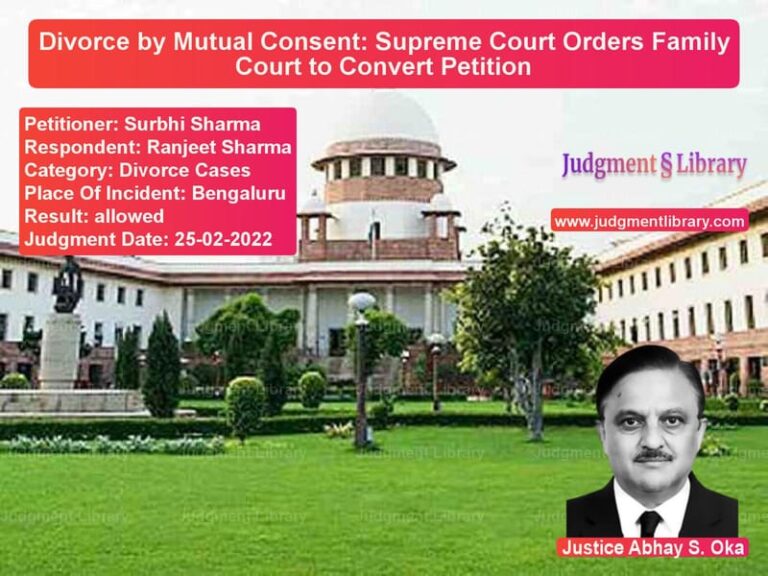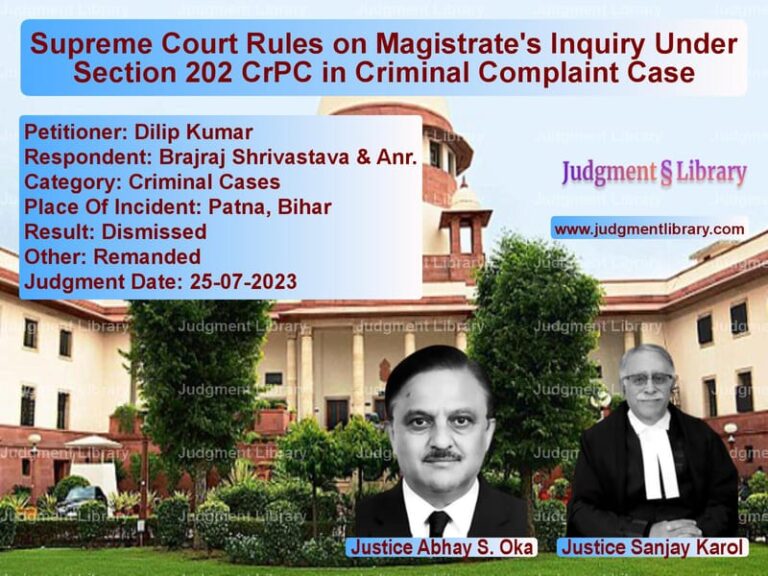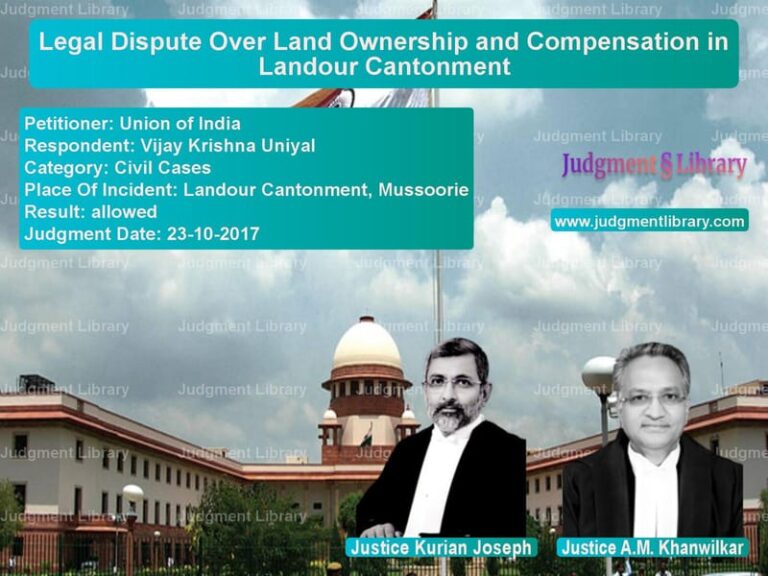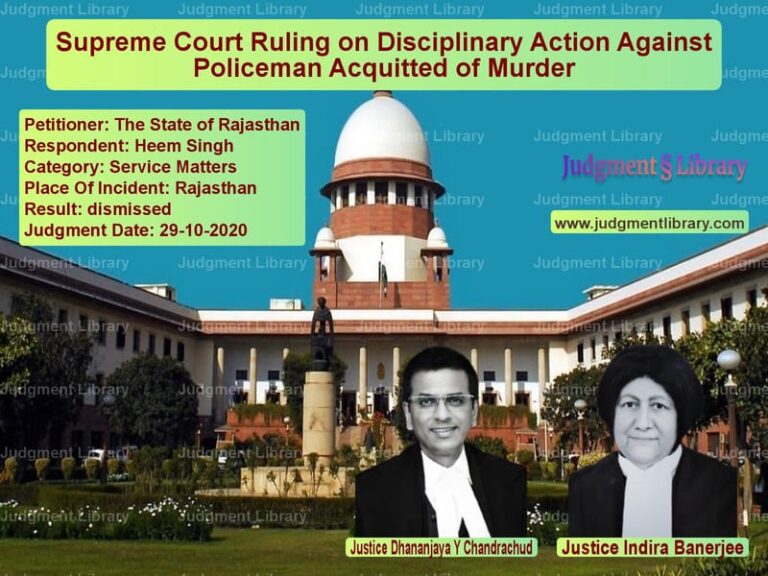Bajri Lease LoI Holders vs. State of Rajasthan: Supreme Court Ruling on Sand Mining and Environmental Protection
The case of Bajri Lease LoI Holders Welfare Society vs. State of Rajasthan revolves around the legal framework governing sand mining in Rajasthan. The Supreme Court had to decide whether the Rajasthan government’s amendments to mining regulations, affecting leaseholders who had received Letters of Intent (LoIs), were valid. The Court also examined the issue of illegal sand mining and environmental violations in the state.
Background of the Case
Recognizing the environmental damage caused by unregulated sand mining, the Ministry of Environment, Forest and Climate Change (MoEFCC) constituted a Core Group in 2009 to study the issue. The Core Group was tasked with:
- Assessing the environmental impact of minor mineral mining.
- Recommending safeguards to minimize damage to water bodies and groundwater.
- Formulating model guidelines for sustainable mining.
Based on its findings, the MoEFCC issued recommendations in 2010, followed by Model Guidelines on the Environmental Aspects of Quarrying of Minor Minerals. In 2012, the Supreme Court’s judgment in Deepak Kumar v. State of Haryana mandated states to implement these guidelines and frame necessary rules under the Mines and Minerals (Development and Regulation) Act, 1957 (MMDR Act).
Rajasthan’s Response and Legal Developments
In response to the Deepak Kumar ruling, Rajasthan amended its mining rules:
- Under the Rajasthan Minor Mineral Concession Rules, 1986, sand mining leases were to be granted via auction for five years.
- LoIs were issued to successful bidders, who were required to obtain Environmental Clearance (EC) before commencing operations.
- Due to delays in granting EC, Rajasthan allowed temporary sand mining operations under Royalty Collection Contracts until ECs were secured.
Despite these regulations, many LoI holders struggled to obtain ECs due to bureaucratic delays. The Rajasthan government further amended the rules in 2017, introducing the Rajasthan Minor Mineral Concession Rules, 2017, which extended the time frame for obtaining EC to 13 months.
However, when the ECs were still delayed, the Rajasthan government refused to grant further extensions, leading to the automatic cancellation of 74 LoIs. The affected leaseholders, under the banner of the Bajri Lease LoI Holders Welfare Society, challenged this decision before the Rajasthan High Court, which dismissed their petition. They then appealed to the Supreme Court.
Arguments by the Petitioner (Bajri Lease LoI Holders Welfare Society)
- The petitioners argued that the delay in obtaining ECs was due to the MoEFCC’s inaction, not their failure to comply with requirements.
- They contended that the Rajasthan government’s decision to cancel their LoIs was arbitrary and unfair, as the delay was beyond their control.
- They sought an extension of the deadline for fulfilling EC requirements and the reinstatement of their LoIs.
Arguments by the Respondents (State of Rajasthan)
- The state government argued that LoI holders had ample time to obtain ECs but failed to do so.
- They contended that extending LoIs indefinitely would disrupt the sand mining regulatory framework.
- The government also highlighted rampant illegal sand mining and the role of some LoI holders in unauthorized mining activities.
Supreme Court’s Observations
The Supreme Court, comprising L. Nageswara Rao, Sanjiv Khanna, and B.R. Gavai, examined the issue of illegal sand mining in Rajasthan and the impact of the regulatory changes. The Court observed:
- The MoEFCC’s delay in granting ECs had indeed created difficulties for LoI holders.
- The state government should have provided greater flexibility in extending LoIs, considering the bureaucratic obstacles involved.
- At the same time, illegal sand mining had reached alarming levels in Rajasthan, necessitating stricter oversight.
The Court noted:
“The damage caused to the environment due to rampant unscientific illegal mining needs no reiteration. Unabated illegal mining has resulted in the emergence of sand mafias who have been conducting illegal mining in the manner of organized criminal activities.”
Key Findings from the Central Empowered Committee Report
To address illegal mining, the Supreme Court had earlier sought a report from the Central Empowered Committee (CEC). The CEC made several recommendations:
- Khatedari leases (private land sand mining leases) within 5 km of riverbanks should be terminated.
- The royalty collection system for sand mining should be abolished.
- The MoEFCC should issue ECs to eligible LoI holders within three months without requiring additional scientific replenishment studies.
- The Rajasthan government should conduct drone surveys to detect illegal mining operations.
- Strict penalties should be imposed, including fines of Rs. 10 lakh per vehicle and Rs. 5 lakh per cubic meter of illegally mined sand.
Supreme Court’s Ruling
The Supreme Court ruled that:
- The CEC’s recommendations (except for the proposed penalties) should be implemented immediately.
- The MoEFCC must issue ECs to all eligible LoI holders within three months.
- The Rajasthan government must terminate all Khatedari leases within 5 km of riverbanks.
- A drone survey should be conducted to identify illegal mining activities.
- The issue of penalties for illegal mining should be reconsidered, with the CEC directed to submit a revised proposal.
Impact of the Judgment
This ruling has significant implications for the sand mining sector:
- Stronger Environmental Protections: The termination of Khatedari leases near riverbanks will help prevent illegal sand extraction.
- Increased Regulatory Oversight: The requirement for drone surveys and stricter enforcement will improve compliance with mining regulations.
- Faster Clearance Process: The directive for the MoEFCC to expedite EC approvals will benefit legitimate mining operators.
- Crackdown on Sand Mafias: The ruling aims to disrupt illegal mining networks that have operated with impunity.
Conclusion
The Supreme Court’s ruling in Bajri Lease LoI Holders Welfare Society vs. State of Rajasthan is a landmark decision balancing economic interests with environmental conservation. While granting relief to legitimate leaseholders, the judgment also enforces strict measures to curb illegal sand mining. The implementation of these directives will be crucial in ensuring sustainable mining practices in Rajasthan.
Petitioner Name: Bajri Lease LoI Holders Welfare Society.Respondent Name: State of Rajasthan & Others.Judgment By: Justice L. Nageswara Rao, Justice Sanjiv Khanna, Justice B.R. Gavai.Place Of Incident: Rajasthan.Judgment Date: 11-11-2021.
Don’t miss out on the full details! Download the complete judgment in PDF format below and gain valuable insights instantly!
Download Judgment: bajri-lease-loi-hold-vs-state-of-rajasthan-&-supreme-court-of-india-judgment-dated-11-11-2021.pdf
Directly Download Judgment: Directly download this Judgment
See all petitions in Environmental Cases
See all petitions in Landlord-Tenant Disputes
See all petitions in Compensation Disputes
See all petitions in Judgment by L. Nageswara Rao
See all petitions in Judgment by Sanjiv Khanna
See all petitions in Judgment by B R Gavai
See all petitions in partially allowed
See all petitions in Modified
See all petitions in supreme court of India judgments November 2021
See all petitions in 2021 judgments
See all posts in Environmental Cases Category
See all allowed petitions in Environmental Cases Category
See all Dismissed petitions in Environmental Cases Category
See all partially allowed petitions in Environmental Cases Category

